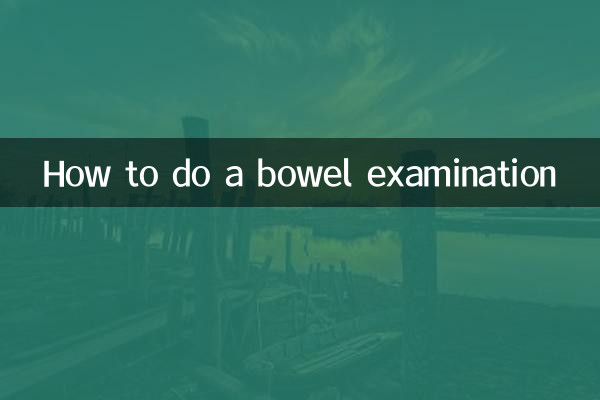How to perform intestinal examination: comprehensive analysis of intestinal examination methods and precautions
Recently, intestinal health has become one of the hot topics on the Internet, especially bowel cancer screening and intestinal examination methods. This article will introduce in detail the common methods of intestinal examination, applicable groups, precautions and the latest technological progress to help you fully understand intestinal examination.
1. Common methods of bowel examination

| Check type | Applicable scenarios | Advantages | Disadvantages |
|---|---|---|---|
| colonoscopy | Bowel cancer screening/polyp diagnosis | Intuitive visualization, biopsiable | Requires bowel preparation, invasive |
| fecal occult blood test | initial screening | Non-invasive and convenient | less accurate |
| CT colonography | Those who cannot tolerate colonoscopy | Non-invasive and fast | Radiation exposure, bowel preparation required |
| Stool DNA testing | early screening | Non-invasive, highly specific | higher cost |
2. Preparation before bowel examination
1.diet modification: A low-residue diet is required 3 days before the examination, and red foods and fruits with seeds should be avoided.
2.Intestinal cleansing: It is necessary to take laxatives to cleanse the intestines the day before the examination. The specific medication must be taken according to the doctor's advice.
3.fasting requirements: Complete fasting is required 8 hours before the examination, but you can drink a small amount of water.
4.medication adjustment: Diabetic patients need to adjust the dosage of insulin, and those taking anticoagulant drugs need to inform their doctor in advance.
3. Precautions after intestinal examination
| Check type | Things to note | recovery time |
|---|---|---|
| colonoscopy | Fasting for 2 hours after surgery and observing bleeding | 1-2 days |
| CT colonography | Drink more water to promote contrast agent excretion | Restore same day |
| stool test | Collect samples correctly according to instructions | No recovery period |
4. Who needs regular bowel examination?
1.People over 50 years old: Colonoscopy is recommended every 5-10 years.
2.Those with family history: If an immediate relative has bowel cancer, the screening age should be 10 years in advance.
3.People with long-term intestinal discomfort: Such as blood in the stool, alternating diarrhea and constipation, unexplained weight loss, etc.
4.patients with inflammatory bowel disease: Patients with ulcerative colitis, Crohn's disease, etc. need to be monitored more closely.
5. Latest technological progress in intestinal examination
1.Artificial Intelligence Assisted Diagnosis: AI technology can improve polyp identification rate and reduce missed diagnosis.
2.capsule endoscopy: Swallowable miniature camera, suitable for small intestine examination.
3.liquid biopsy: Detect circulating tumor DNA through blood to achieve non-invasive screening.
4.Microbiome testing: Analyze changes in intestinal flora and predict disease risks.
6. Frequently Asked Questions
Q: Is the bowel examination painful?
A: Modern painless colonoscopy has been widely used, and the examination process is basically painless. Ordinary colonoscopy only has mild discomfort.
Q: How much does a bowel examination cost?
A: Ordinary colonoscopy costs about 300-800 yuan, painless colonoscopy costs 1,000-2,000 yuan, and fecal DNA testing costs about 2,000-3,000 yuan.
Q: Does intestinal examination require hospitalization?
A: Routine screening bowel examination does not require hospitalization, and special therapeutic procedures may require short-term observation.
7. Summary of suggestions
Bowel examination is an important means of preventing bowel cancer, and it is recommended that high-risk groups undergo regular screening. When choosing an examination method, you should consider your own situation and your doctor’s recommendations. As technology advances, bowel examinations are becoming more accurate and more comfortable, and early screening can significantly improve cure rates. If you find abnormal symptoms, please seek medical treatment promptly and do not conceal your illness or avoid medical treatment.
Note: The statistical time of this article is based on the compilation of hot topics on the Internet in the last 10 days. Please refer to the clinician's guidance for the specific examination plan.

check the details

check the details